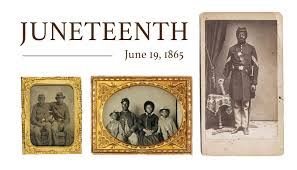General Granger Sabotaged Juneteenth
Even though General Gordan Granger delivered the announcement that slavery was over in Texas it did not end, and the “General” did a lot to sabotage the announcement to help the slave masters. Reconstruction was hacked in advance of its birth by the wording in the 13th Amendment and by General Gordon Granger in 1865. Granger read the famous Order Number 3 on June 19, 1865, but what is ignored is the fact that he forced blacks to sign contracts forcing many to return to the plantation. This planting of the seed by Granger eventually gives authority to the idea of vagrancy laws and charging Blacks with false crimes to return them to what Douglas A. Blackmon referred to as Slavery by Another Name. Between 1865 and 1867, racist whites murdered about 50 Blacks who tried to leave parts of East Texas after they received news that they were free. When Blacks were murdered by vigilantes, their corpses were paraded through black populated areas for show. They also threatened any Black person with death who tried to leave the plantation or celebrate Juneteenth.
Racists killed many Blacks if they were caught celebrating freedom after June 19, 1865. According to James Smallwood in Time of Hope, Time of Despair (1981), “the Sheriff of DeWitt County shot a black for whistling Yankee Doodle, while in Red River County whites murdered blacks for the fun of it.” In Limestone County, one racist who called himself “Dixie” said that he killed all the “Freemen he could catch,” and in 1874, a racist from Goliad County said, “He liked to kill Indians but preferred killing Negroes.” Juneteenth was quite clearly a time of hope and hell. According to Smallwood, in 1869, a black pastor named George Porter was murdered by white racists because he was providing advice about their civil rights under Reconstruction at church and in the community. At Columbia, Texas, a group of armed racists invaded a black church and killed a member. There would be no let up from the hellish seeds planted by the expansionist minded slave owners and Gordon Granger is no hero.
The forced contract labor that Gordon Granger ordered on June 19, 1865, helped to produce the Homestead Act. This law would allow former slave owners to take control of millions of acres of land as a result of the final passage during the Texas Legislature 11th session in 1866. It also created vagrancy laws to convict blacks, to prevent them from filing for the available land. This act gave whites millions of acres of land for free and thus created wealth for whites, while keeping blacks without land inheritances. This was not the case of strong sturdy men getting a reward for their work ethic, but was a free handout if you were white.
The pathway to the exploitation of Black people was set in place on Juneteenth of 1865 when General Gordon Granger required that blacks stay on the plantation, have passes when traveling, and prevent Black people from congregating around army bases for protection. Black codes (adopted in 1865—1866) were used to prevent freedom for enslaved people by creating and passing legislation that included vagrancy laws, convict leasing, debt peonage, and other invented crimes to sabotage the 13th Amendment. General Gordon Granger had a lot to do with this in Texas. Don’t listen to people making the claim that the 13th Amendment abolished slavery—it did not. The emancipation orders read by General Granger on Juneteenth did not end brutal slavery either.





